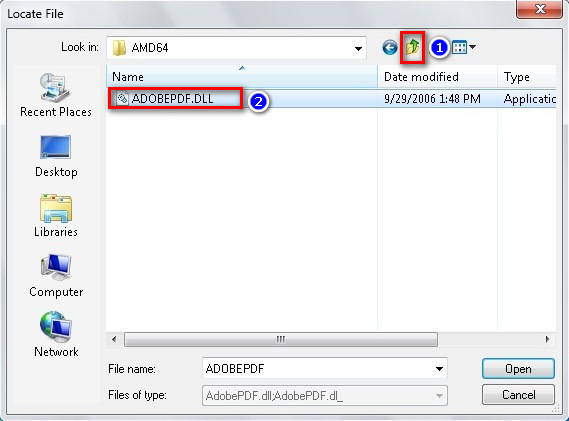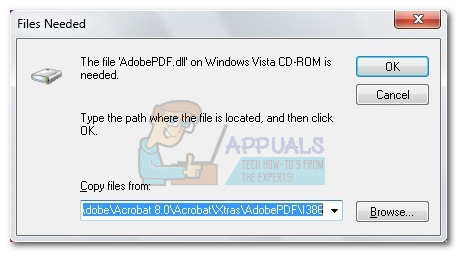Fix: The file AdobePDF.dll is needed
The error “The file AdobePDF.dll is needed” typically appears when the user tries to install an older version of Adobe Acrobat (particularly Adobe Acrobat 8 and Adobe Creative Suite CS3). The user is then given the option to browse for the required file. Most of the time, this issue is triggered on Windows 64-bit operating systems.
This issue happens because one component (Adobe PDF printer) is not supported on 64-bit operating systems, so the installer doesn’t extract the AdobePDF.dll file when the user kickstarts the installation process. Because of this, the file cannot be located by the installer.
If you’re currently struggling with this issue, we bring good news. We have successfully managed to identify a collection of methods that have enabled users in a similar situation to resolve the problem. Please follow the methods below in order until you encounter a fix that resolves your situation and allows you to install the Adobe product.
Method 1: Using the existing AdobePDF.dll file
The easiest method out of the bunch is to use an already extracted AdobePDF.dll version. If you already installed another Adobe program prior to this method, there’s a high chance that this method will resolve your situation.
Here’s a quick guide to using an already extracted version of AdobePDF.dll:
- When the Files Needed windows come up, click the Browse button.
- Click the folder up icon, then select the AdobePDF.dll file from the AMD 64 folder.

- With the AdobePDF.DLL file selected click on Open, then continue with the installation. You should be able to install the Adobe product without issues.
If you are unable to find the file or this method is not applicable, continue with Method 2.
Method 2: Extract the adobepdf.dll_64 from the data1.cab file
This method is not only confirmed to work by a lot of users, it’s also the default solution recommended by Adobe technicians for this problem. This method involves manually extracting the adobepdf.dll_64 file from the data1.cab file and renaming it if necessary.
Follow the guide below to complete the installation using the adobepdf.dll_64 file as a substitute for AdobePDF.dll:
- When the Files Needed prompt comes up, minimize it and navigate to the CD media or installation package that contains the setup.exe file of the Adobe product.
- Right-click on data1.cab and open it with a compression utility such as WinZip or WinRar.
- Extract the adobepdf.dll_64 file from data1.cab and put it somewhere accessible like your desktop.
- Rename the adobepdf.dll_64 to adobepdf.dll, but be careful so you don’t delete the DLL extension.
- Return to the Files Needed prompt, click on Browser and select the file that you’ve just modified. You should be able to complete the installation without issues.
If you’re still unable to get past the “The file AdobePDF.dll is needed” error, continue with the final method.
Method 3: Download the AdobePDF.dll file externally
If the first two methods where a bust, you can fix the issue in a different way. This method implies downloading the AdobePDF DLL file externally from a 3rd party website. Normally, we won’t recommend this type of procedure, but since you have no other choice, please follow the steps below in order to do it safely.
Follow the steps below to use an external AdobePDF.dll file:
- Visit this link (here) and download the AdobePDF.dll file appropriate to your Windows version.
Note: The file was verified and does not contain any traces of malware. - When the Files Needed prompt appears, hit the Browse button and navigate to the location of the file that you’ve just downloaded.
 Note: If you haven’t downloaded in a custom location, you’ll find the external AdobePDF.dll file in the Downloads folder. Then, hit Open to load the file into the installer.
Note: If you haven’t downloaded in a custom location, you’ll find the external AdobePDF.dll file in the Downloads folder. Then, hit Open to load the file into the installer. - Click OK and follow the on-screen prompts to complete the installation. You should be able to complete the installation without issues.